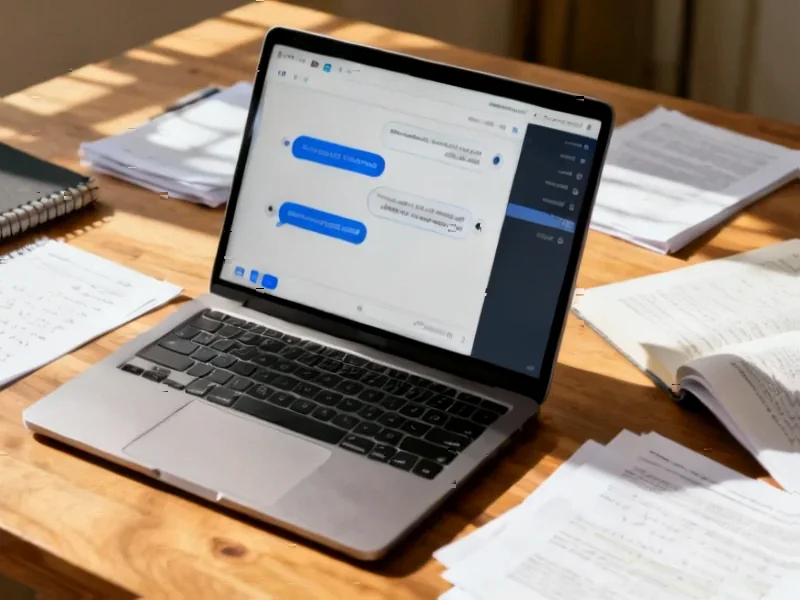According to 9to5Mac, Apple has finalized its strategy for the new Siri update coming with iOS 26.4 in spring 2025, where Google Gemini models will power much of the experience behind the scenes. The custom Gemini model will run on Apple’s Private Cloud Compute servers to fulfill user requests, enabling Siri to answer personal questions by hunting through device data and generating responses on-the-fly. The new Siri architecture will feature three components – query planner, knowledge search system, and summarizer – with Google Gemini providing planner and summarizer capabilities while maintaining privacy through Apple’s server infrastructure. Despite extensive backend implementation, Apple isn’t expected to promote this partnership, instead marketing the technology as Apple’s own running on Apple servers.
The Strategic Admission of Defeat
This arrangement represents Apple’s quiet acknowledgment that its own large language model development has fallen critically behind competitors. While Apple has been aggressively hiring AI talent and acquiring startups, the timeline to develop competitive foundation models appears longer than market pressures allow. The company faces a classic build-versus-buy dilemma, and this hybrid approach lets them ship features now while continuing internal development. What’s particularly telling is that Apple reportedly considered multiple partners including OpenAI before settling on Google, suggesting they’re prioritizing capability over partnership exclusivity. This mirrors Microsoft’s early Azure strategy where they initially relied on third-party components while building their own replacements.
The Privacy Paradox
Apple’s promise that user privacy will be preserved by running Google models on Apple’s servers creates a significant technical and trust challenge. While the data may not leave Apple’s infrastructure, the models themselves are Google’s intellectual property, creating a dependency that contradicts Apple’s typical vertical integration strategy. The company’s social media channels have historically emphasized complete control over user data, but this arrangement introduces a third-party AI model into the most personal of interactions – your voice assistant. There’s also the question of how Apple will audit and verify that no data leakage occurs through the model outputs or training processes, especially given Google’s business model relies on data collection.
The Branding Deception Risk
Marketing Siri as Apple technology while relying heavily on Google’s AI creates substantial brand risk when – not if – users discover the truth. We’ve seen similar scenarios play out poorly in other industries where companies outsourced core technology while maintaining the fiction of proprietary development. The comparison to Samsung’s “Galaxy AI” being thin wrappers around Google Gemini is particularly damning for a company that prides itself on differentiation. When technical issues arise or limitations become apparent, the blame will likely fall on Apple despite the underlying technology being Google’s responsibility. This creates a classic principal-agent problem where neither company has complete control or accountability.
Technical Integration Challenges
The three-component architecture – query planner, knowledge search, and summarizer – creates multiple points of potential failure in the AI pipeline. Having Google models handle planning and summarization while Apple manages on-device personal data processing requires seamless handoffs that could introduce latency and errors. We’ve seen similar hybrid approaches struggle in enterprise AI deployments where different model providers handle different parts of the workflow. The technical demonstrations will need to show flawless integration to avoid the stilted, context-losing conversations that have plagued previous Siri iterations. There’s also the question of how Apple will handle model updates from Google without breaking their own user experience guarantees.
Long-Term Strategic Implications
This partnership suggests Apple views AI as sufficiently critical that they’re willing to compromise their usual control-first approach, similar to their Intel-to-Apple Silicon transition period. The danger lies in creating a dependency that becomes difficult to unwind, much like Google’s current dominance in search. If Apple’s internal AI development continues to lag, they risk becoming permanently dependent on Google for what may become the most important technology of the next decade. The spring 2025 timeline gives them approximately a year to either catch up or cement this dependency – a remarkably short window for such fundamental technology. This arrangement may work as a stopgap, but it creates strategic vulnerability in Apple’s ecosystem that competitors will undoubtedly exploit.




Your article helped me a lot, is there any more related content? Thanks!